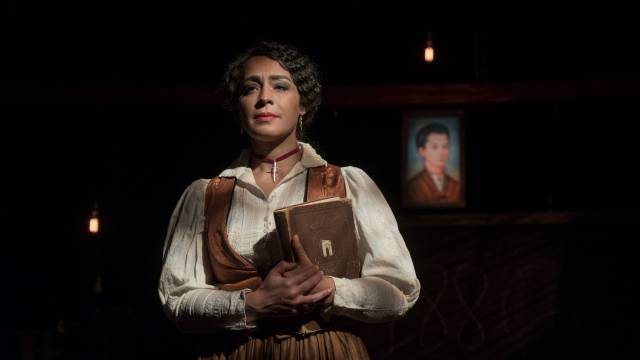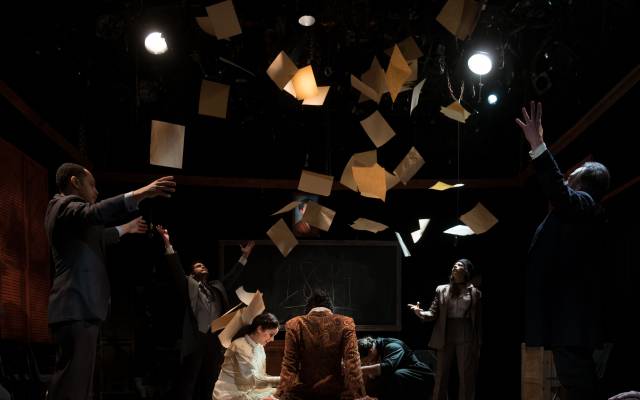

It’s strange to realize a play that for the most part takes place in 19th century Dominican Republic, feels eerily appropriate for our times, and yet that’s precisely what happens in En el nombre de Salomé. Based on Julia Alvarez’s eponymous fictional biography of Dominican poet Salomé Ureña Henríquez, the play centers on the poet’s life as seen through her daughter Camila (an astonishing Zulema Clares) who has found her own accomplishments overshadowed by her mother’s fame. A story about women who overcome the obstacles imposed on them by patriarchal structures, the play also deals with congressional crises, the violation of basic human rights, and the importance of art in times of social chaos. I spoke to director José Zayas about why it was important to bring this story to the stage.
Can you talk about how the novel’s structure and how you used it in the play?
The structure has alternating chapters, Camila’s story is told backwards and Salomé’s story is told forward, it’s a structure Julia Alvarez has used in other of her novels as well. The difficulty was how to keep what was interesting in the novel, because it’s a story about these two women who never meet, so we had to choose who would carry the story. We made the decision the play would take place in the epilogue when Camila goes back to the Dominican Republic, and then we’d move back and forth in time, to find a place for the women to connect.
What research did you do beyond the novel and the script?
I did the research I always do, actors also bring their own material, I don’t do a lot of deep historical research, I let the novel tell me what is there, and then I do very basic work regarding timeline and then I let the story tell itself in a way. Part of what Marco Antonio Rodriguez wanted to do was to show irreverence for the past, which allows us to play. We don’t know how these people talked to each other, if he had gone for a 19th century language it would’ve been a different kind of play. What’s interesting is to see how his voice plays with history.
The play is about real life people, does this restrict what you can do in terms of character, or do you treat them the same way you would fictional people?
Not at all because we’re only seeing a particular facet of these people, Salomé in the narrative of the play is Camila’s figment, she is who Camila thinks Salomé was. The performers have respect for their characters, but they also want to play with the story. I’m not someone who is nervous about hagiography, I’ve done other historical pieces before, so my responsibility is to work on something that’s enjoyable for the audience.
How was your work with Zulema Clares specifically since she plays Camila at every age?
We could’ve had other actresses play Camila in the past, but this is a dramatic choice I’ve made in other productions too. Novels are about the passage of time, especially if they have an epic span, so something I would miss is seeing an actor who I connect to, not to go through that journey as well. So I have an actor in their 40s play someone at age 9 and then 79, the magic of theatre is that it’s metaphor, so the audience believes what you tell them. My work with Zulema was to refine what Camila need in each part of the story, she’s trying to figure out who she is. Zulema is an amazing performer and we’ve worked together before, so there’s not much for me to do other than to go through the narrative, and seeing how to shift her tone in specific moments. There’s no magic formula or anything.

Camila in a way is like a director shaping the path and tone of the story. Do you ever discover you unconsciously included aspects of yourself in the plays you direct?
Absolutely, I eventually find myself in every piece I direct. I choose the pieces because they’re saying something to me at the moment, I’m Dominican and Puerto Rican, and we’re living in a cultural climate that not only reflects that, but also concerns in the novel and play. It’s a play about oppression, dealing with dangerous administrations and resisting within that. All the pieces I’ve done as adaptations have been that way, I gravitate towards adaptation because of the directorial trick of discovering how the play connects to you. Every night I discover something different.
The scene in which Camila says “the world is starting to resemble our countries” was so powerful because it perfectly reflects what we’re seeing in America now in terms of political instability. Did rehearsals become different because of how relevant the play was all of a sudden?
Everyone I know feels powerless watching the news, but when you work on something that relates so much to the moment you feel like you’re actually doing something. Even when the play doesn’t necessarily relate to the specific time, you’re always looking for those moments that touch you and make you realize why you’re doing the play. Instead of going into the darkness it allows us to be more ironic, the story begins in 1856 and it feels the same, it’s shocking to me that nothing has changed. But people have survived, so there’s hope in that. We have to marry this to the darkness but that’s important because darkness exists.
Why would you say it’s more important than ever for us to tell and see Latinx stories onstage?
Because we’re still not present enough. It’s thrilling that we have a successful company in New York City, but we don’t have a lot of non-native speakers come into Repertorio to hear the stories, we don’t have a lot of people who know who Salomé is. People walk past community colleges and Salomé Ureña schools in NYC and they don’t know who she was, for me it’s important not only to talk about historical figures, but also people living in the present. These stories put us in touch with things that are pushed aside, we need stories about immigrants, people who come to America in chains. Part of my mission is to do the plays outside NYC too, to do them in English and Spanish, I did a play in Minneapolis that I’d done in Repertorio a while back, we have a lot of work to do still, but it’s exciting, necessary work.
For more information and tickets to En el nombre de Salomé click here.